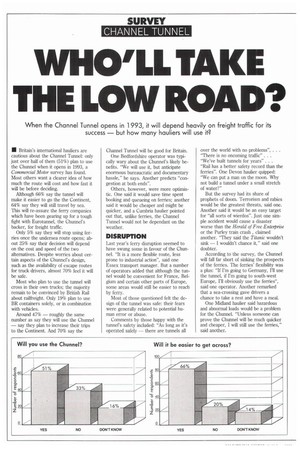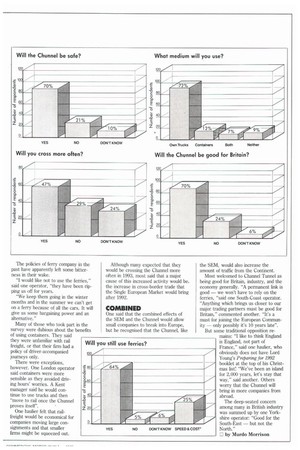WHO'LL TAKE THE LOW ROAD?
Page 58

Page 59

If you've noticed an error in this article please click here to report it so we can fix it.
• Britain's international hauliers are cautious about the Channel Tunnel: only just over half of them (51%) plan to use the Chunnel when it opens in 1993, a Commercial Motor survey has found. Most others want a clearer idea of how much the route will cost and how fast it will be before deciding.
Although 66% say the tunnel will make it easier to go the the Continent, 64% say they will still travel by sea. This will re-assure the ferry companies which have been gearing up for a tough fight with Eurotunnel, the Chunnel's backer, for freight traffic.
Only 5% say they will stop using ferries once the undersea route opens; about 25% say their decision will depend on the cost and speed of the two alternatives. Despite worries about certain aspects of the Chunnel's design, such as the availability of escape routes for truck drivers, almost 70% feel it will be safe.
Most who plan to use the tunnel will cross in their own trucks; the majority remain to be convinced by British Rail about railfreight. Only 19% plan to use BR containers solely, or in combination with vehicles.
Around 47% — roughly the same number as say they will use the Chunnel — say they plan to increase their trips to the Continent. And 70% say the Channel Tunnel will be good for Britain.
One Bedfordshire operator was typically wary about the Chunnel's likely benefits. "We will use it, but anticipate enormous bureaucratic and documentary hassle," he says. Another predicts "congestion at both ends".
Others, however, were more optimistic. One said it would save time spent booking and queueing on ferries; another said it would be cheaper and might be quicker, and a Cumbria haulier pointed out that, unlike ferries, the Channel Tunnel would not be dependant on the weather.
Last year's ferry disruption seemed to have swung some in favour of the Chunnel. "It is a more flexible route, less prone to industrial action", said one Essex transport manager. But a number of operators added that although the tunnel would be convenient for France, Belgium and certain other parts of Europe, some areas would still be easier to reach by ferry.
Most of those questioned felt the design of the tunnel was safe: their fears were generally related to potential human error or abuse.
Comments by those happy with the tunnel's safety included: "As long as it's operated safely — there are tunnels all over the world with no problems", . . . "There is no oncoming traffic". . . "We've built tunnels for years" . . . "Rail has a better safety record than the ferries". One Devon haulier quipped: "We can put a man on the moon. Why not build a tunnel under a small stretch of water?"
But the survey had its share of prophets of doom. Terrorism and rabies would be the greatest threats, said one. Another said it would be an easy target for "all sorts of wierdos". Just one simple accident would cause a disaster worse than the Herald of Free Entaprise or the Purley train crash, claimed another. "They said the Titanic wouldn't sink — I wouldn't chance it," said one doubter,
According to the survey, the Chunnel will fall far short of sinking the prospects of the ferries. The ferries' flexibility was a plus: "If I'm going to Germany, I'll use the tunnel, if I'm going to south-west Europe, I'll obviously use the ferries", said one operator. Another remarked that a sea-crossing gave drivers a chance to take a rest and have a meal.
One Midland haulier said hazardous and abnormal loads would be a problem for the Chunnel. "Unless someone can prove the Chunnel will be much quicker and cheaper, I will still use the ferries," said another. The policies of ferry company in the past have apparently left some bitterness in their wake.
"I would like not to use the ferries," said one operator, "they have been ripping us off for years.
"We keep them going in the winter months and in the summer we can't get on a ferry because of all the cars. It will give us some bargaining power and an alternative."
Many of those who took part in the survey were dubious about the benefits of using containers. They said they were unfamiliar with rail freight, or that their firm had a policy of driver-accompanied journeys only.
There were exceptions, however. One London operator said containers were More sensible as they avoided driving hours' worries. A Kent manager said he would continue to use trucks and then "move to rail once the Chunnel proves itself'.
One haulier felt that railfreight would be economical for companies moving large consignments and that smaller firms might be squeezed out. Although many expected that they would be crossing the Channel more often in 1993, most said that a major cause of this increased activity would be. the increase in cross-border trade that the Single European Market would bring after 1992.
One said that the combined effects of the SEM and the Chunnel would allow small companies to break into Europe, but he recognised that the Chunnel, like the SEM, would also increase the amount of traffic from the Continent.
Most welcomed to Channel Tunnel as being good for Britain, industry, and the economy generally. "A permanent link is good — we won't have to rely on the ferries, "said one South-Coast operator. "Anything which brings us closer to our major trading partners must be good for Britain," commented another. "It's a must for joining the European Community — only possibly it's 10 years late".
But some traditional opposition re mains: "I like to think England is England, not part of France," said one haulier, who obviously does not have Lord Young's Preparing for 1992 booklet at the top of his Christ mas list! "We've been an island for 2,000 years, let's stay that way," said another. Others worry that the Chunnel will bring in more companies from abroad.
The deep-seated concern among many in British industry was summed up by one Yorkshire operator: "Good for the South-East — but not the North."
C] by Murdo Morrison














































































































































































